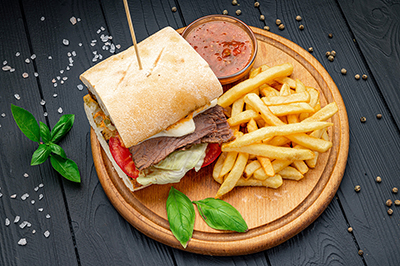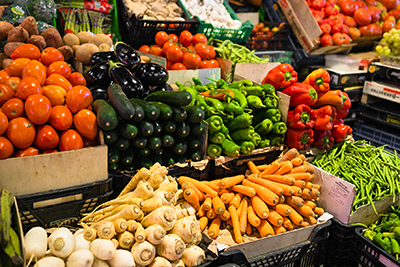How Well Do You Eat v. Do You Eat Well?
Nutrition is a vast subject and experts differ on what eating well means. You may have a “perfect” diet, but how well are you eating it? Maximizing your digestion and preventing health issues is not just about what you eat but also about how you consume your food.
Try this short Yes or No quiz and see how well you are eating:
- When I eat, I am almost always sitting down and not distracted by a screen.
- I eat my meals at the same time each day.
- I eat fast food once a week or less.
- I rarely skip a meal (unless it is part of deliberate fasting).
- My food gives me energy, v. making me feel lethargic and sleepy.
- I eat until I am full or almost full, then I stop.
- I enjoy the process of eating, rather than looking at meals as a chore.
- My plate is filled with a variety of different foods.
- As a rule, I don’t drink sugar-sweetened beverages.
- I regard my personal nutrition as an important part of staying healthy.
If you answered yes less than 5 times, prepare to feel better after making a few simple changes! If you answered yes 5–8 times, you’re doing OK, but there is always room for improvement!
If you answered yes 8–10 times, great job, but still read on: There may be something new for you here!
Eating while staying calm and focusing on our food is a key to managing both the amount of food we eat and how well we digest it. A number of studies have shown that people who use their smartphones while eating eat more calories than people who simply eat their food.[1] Regular eating times are also important because our bodily functions run on a series of internal clocks which rely on regular eating, sleeping, and movement to work properly. When these internal timepieces are out of sync, our risk of chronic disease increases.[2]
 Fast food is loaded with sugar, inflammatory fats, and salt. Adults who eat out more than twice a week are less successful with weight loss or maintenance.[3] While skipping meals can mess up your internal clocks and lead to chronic health issues, fasting can be of benefit if done properly. In a study done on adults who regularly skipped breakfast due to intermittent fasting, the decrease in glucose intake and overall calories led to decreased risks of cardiovascular disease. Be aware, however, that with fewer eating opportunities, high-nutrient foods are especially important to eat during your meals to prevent deficiencies.[4]
Fast food is loaded with sugar, inflammatory fats, and salt. Adults who eat out more than twice a week are less successful with weight loss or maintenance.[3] While skipping meals can mess up your internal clocks and lead to chronic health issues, fasting can be of benefit if done properly. In a study done on adults who regularly skipped breakfast due to intermittent fasting, the decrease in glucose intake and overall calories led to decreased risks of cardiovascular disease. Be aware, however, that with fewer eating opportunities, high-nutrient foods are especially important to eat during your meals to prevent deficiencies.[4]
If you find you don’t feel well after eating, you may be eating too much or too quickly. A sleepy feeling after a big meal usually means that your pancreas has had to secrete a lot of insulin to handle the sugars you have eaten. This is followed by a big dip in your blood sugar, which makes you feel tired and lethargic. One way to manage this is to save most of your dense carbohydrates—such as root vegetables, grains, and beans—for your evening meal.
Doing this allows your energy to be supported through the day, while the dense carbs can help you fall asleep more easily at night. You might also need some digestive support from digestive enzymes and a good probiotic to take at bedtime.
Sometimes it can be hard to tell when we are full. We think we are, but then dessert lands on the table and we suddenly still have “room”! Many of our processed foods are designed to suppress the chemicals in our brain telling us we are full. If a particular food feels like your “kryptonite” (mine is ice cream), it is better not to keep large amounts of it in the house, and only eat a little, occasionally outside the home.
 Eating regular meals with plenty of diverse foods can be more challenging when you are on a tight budget, living on your own, working shifts, or dealing with food restrictions.[5] It is still important even in these situations to source as wide a variety of food as you can, and taking the time to eat as regularly as possible. Community-supported agriculture and cooperatives provide access to food that is typically more affordable, and fresher compared to grocery stores. Additionally, food banks and community food pantries offer free food options. You may have space for a garden or a few pots to grow herbs. A variety of food, especially plant food, will add diversity to your gut microbiome, will benefit your immune system, and will help prevent chronic disease. Next time you sit down to eat a meal, be as mindful of how you are eating it as of what you are eating.
Eating regular meals with plenty of diverse foods can be more challenging when you are on a tight budget, living on your own, working shifts, or dealing with food restrictions.[5] It is still important even in these situations to source as wide a variety of food as you can, and taking the time to eat as regularly as possible. Community-supported agriculture and cooperatives provide access to food that is typically more affordable, and fresher compared to grocery stores. Additionally, food banks and community food pantries offer free food options. You may have space for a garden or a few pots to grow herbs. A variety of food, especially plant food, will add diversity to your gut microbiome, will benefit your immune system, and will help prevent chronic disease. Next time you sit down to eat a meal, be as mindful of how you are eating it as of what you are eating.
 Wendy Presant, RHNC, CFMP
Wendy Presant, RHNC, CFMP
With a background in nursing, naturopathic, and functional medicine, Wendy Presant is currently registered as a health-and-nutrition counsellor. She provides virtual coaching services to individuals looking to optimize their health.
naturalcoachathome.care
[1] Gonçalves, R.F. de M., D. de A. Barreto, P.I. Monteiro, M.G. Zangeronimo, P.M. Castelo, A. van der Bilt, and L.J. Pereira. “Smartphone use while eating increases caloric ingestion.” Physiology & Behavior, Vol. 204 (2019): 93–99.
[2] Lee, Y., and J.P. Wisor. “Multi-modal regulation of circadian physiology by interactive features of biological clocks.” Biology, Vol. 11, No. 1 (2021): 21.
[3] Kruger, J., H.M. Blanck, and C. Gillespie. “Dietary practices, dining out behavior, and physical activity correlates of weight loss maintenance.” Preventing Chronic Disease, Vol. 5, No. 1 (2008): A11.
[4] Santos, H.O., and G.M. Tinsley. “Is breakfast consumption detrimental, unnecessary, or an opportunity for health promotion? A review of cardiometabolic outcomes and functional food choices.” Diabetes/Metabolism Research and Reviews, 2023 July 3: e3684, online ahead of print.
[5] Shinwell, J., M. Bateson, D. Nettle, and G.V. Pepper. “Food insecurity and patterns of dietary intake in a sample of UK adults.” The British Journal of Nutrition, Vol. 128, No. 4 (2022): 770–777.

 Stores
Stores